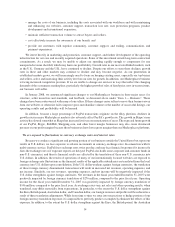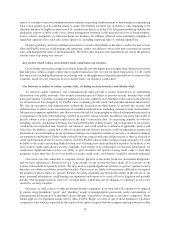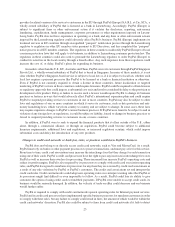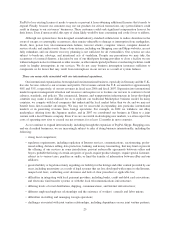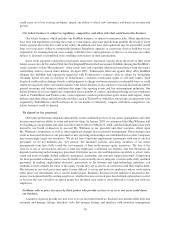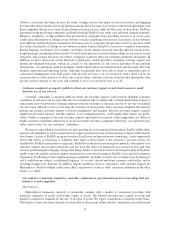eBay 2007 Annual Report Download - page 32
Download and view the complete annual report
Please find page 32 of the 2007 eBay annual report below. You can navigate through the pages in the report by either clicking on the pages listed below, or by using the keyword search tool below to find specific information within the annual report.restrict our service offerings, and the imposition of any regulations on our users may harm our business. In addition,
we may be subject to overlapping legal or regulatory regimes that impose conflicting requirements on us. Our
failure to comply with foreign laws could subject us to penalties ranging from criminal prosecution to significant
fines to bans on our services.
If PayPal were found to be subject to or in violation of any U.S. laws or regulations governing banking,
money transmission, or electronic funds transfers, it could be subject to liability and forced to change its
business practices.
Nearly all U.S. states and territories have enacted legislation regulating money transmitters. To date, PayPal
has obtained licenses in 41 of these jurisdictions and interpretations in six states that licensing is not required under
their existing statutes, and is applying for licenses in two additional states. The remaining U.S states and territories
do not currently regulate money transmitters. As a licensed money transmitter, Paypal is subject to bonding
requirements, restrictions on its investment of customer funds, reporting requirements, and inspection by state
regulatory agencies. In July 2005, PayPal entered into a settlement agreement and agreed to pay $225,000 to the
California Department of Financial Institutions in connection with alleged violations of the California Financial
Code relating to the use of a receipt form for international payments that had not been pre-approved by the
Department, and incomplete reporting to the Department. If PayPal were found to be in violation of other money
services laws or regulations, PayPal could be subject to liability, forced to cease doing business with residents of
certain states, or forced to change its business practices. Any change to PayPal’s business practices that makes the
service less attractive to customers or prohibits its use by residents of a particular jurisdiction could decrease the
velocity of trade on eBay, which would further harm our business. Even if PayPal is not forced to change its business
practices, it could be required to obtain additional licenses or regulatory approvals that could impose a substantial
cost on PayPal.
Although there have been no definitive interpretations to date, PayPal has assumed that its service is subject to
the Electronic Fund Transfer Act and Regulation E of the Federal Reserve Board. As a result, among other things,
PayPal must provide advance disclosure of changes to its service, follow specified error resolution procedures and
reimburse consumers for losses above $50 from transactions not authorized by the consumer. PayPal currently
voluntarily reimburses consumers for all financial losses from transactions not authorized by the consumer, not just
losses above $50. PayPal seeks to pass most of these losses on to the relevant merchants, but PayPal incurs losses if
the merchant does not have sufficient funds in its PayPal account. In addition, PayPal is subject to the financial
privacy provisions of the Gramm-Leach-Bliley Act, state financial privacy laws, and related regulations. As a result,
some customer financial information that PayPal receives is subject to limitations on reuse and disclosure. Existing
and potential future privacy laws may limit PayPal’s ability to develop new products and services that make use of
data gathered through its service. The provisions of these laws and related regulations are complicated. Even
technical violations of these laws can result in penalties of up to $1,000 for each non-compliant transaction. PayPal
processed an average of approximately 1.96 million transactions per day during the year ended December 31, 2007,
and any violations could expose PayPal to significant liability. Any negative change in the public’s perception of
PayPal’s compliance with privacy laws and policies could also negatively impact PayPal’s business.
PayPal is subject to regulation as a bank in Luxembourg, and its status under banking or financial ser-
vices laws or other laws in markets outside the U.S. is unclear.
PayPal currently allows its customers with credit cards to send payments from 190 markets, and allows its
customers to receive payments in 65 of those markets (including the U.S.). Customers can only withdraw funds
electronically to local bank accounts in 35 of these 65 markets. In 26 of these 65 markets customers can withdraw
funds electronically to their credit or debit card. In two of these 65 markets customers can only withdraw funds
locally by receiving a bank draft in the mail, and in another two of these 65 markets, customers cannot withdraw
locally and can only withdraw funds if they have a U.S. bank account. These limitations affect PayPal’s ability to
grow in these markets. PayPal also offers customers the ability to send or receive payments denominated in
17 currencies. Of the 190 markets whose residents can use the PayPal service, 31 (27 countries plus four French
overseas departments) are members of the European Union. Previously, PayPal delivered services in the EU through
a subsidiary in the United Kingdom licensed to operate as an Electronic Money Institution. As of July 2007, PayPal
22




